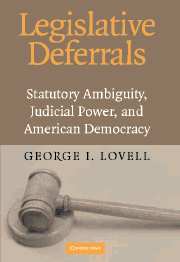Book contents
- Frontmatter
- Contents
- Acknowledgments
- Preface
- 1 Rethinking Judicial Policy Making in a Separation of Powers System
- 2 False Victories: Labor, Congress, and the Courts, 1898–1935
- 3 “As Harmless as an Infant”: The Erdman Act in Congress and the Courts
- 4 Killing with Kindness: Legislative Ambiguity, Judicial Policy Making, and the Clayton Act
- 5 The Norris-LaGuardia Act, for Once: Learning What to Learn from the Past
- 6 Legislative Deferrals and Judicial Policy Making in the Administrative State: A Brief Look at the Wagner Act
- 7 Conclusion
- Reference List
- References
- Index
5 - The Norris-LaGuardia Act, for Once: Learning What to Learn from the Past
Published online by Cambridge University Press: 14 July 2009
- Frontmatter
- Contents
- Acknowledgments
- Preface
- 1 Rethinking Judicial Policy Making in a Separation of Powers System
- 2 False Victories: Labor, Congress, and the Courts, 1898–1935
- 3 “As Harmless as an Infant”: The Erdman Act in Congress and the Courts
- 4 Killing with Kindness: Legislative Ambiguity, Judicial Policy Making, and the Clayton Act
- 5 The Norris-LaGuardia Act, for Once: Learning What to Learn from the Past
- 6 Legislative Deferrals and Judicial Policy Making in the Administrative State: A Brief Look at the Wagner Act
- 7 Conclusion
- Reference List
- References
- Index
Summary
We speak about the abuse of equity powers, we denounce the courts. Oh, let us put the fault where it lies – our legislators, subject to election, realizing the public mind, evade their responsibility by delegating it to the court in order that they may accomplish their end, and yet stand with a clear slate before the popular vote to which they must be responsible.
AFL Vice President Matthew Woll, explaining the failure of the Clayton Act to the 1930 AFL ConventionAny bitterness felt by labor organizations as a result of the Supreme Court ruling on the Clayton Act in Duplex v Deering did not quickly translate into effective political campaigns for new legislation limiting the power of the courts. The ruling came at the beginning of a very difficult decade for labor organizations in national politics (Bernstein 1960). That lean political period seems to have ended, however, with passage of a new antiinjunction statute in 1932, the Norris LaGuardia Act.
Measured against the longstanding legislative goals of curtailing yellow-dog contracts and injunctions, the Norris-LaGuardia Act was a success in precisely the areas where federal labor legislation of the preceding decades had failed. The act contained provisions that closely parallel failed provisions in the Erdman and Clayton acts. Yet judges read the Norris-LaGuardia provisions with much more sympathy for labor's expressed goals than the judges who interpreted earlier laws.
- Type
- Chapter
- Information
- Legislative DeferralsStatutory Ambiguity, Judicial Power, and American Democracy, pp. 161 - 216Publisher: Cambridge University PressPrint publication year: 2003



